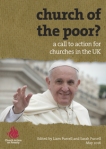Michael Hirst has carried out research into the Methodist Church’s presence in poor communities. He explains some of the challenges it revealed for the vision of building a “church of the poor”.
New research on the positioning of the Methodist Church suggests that Methodist ministers live predominantly in less deprived areas and that bias has increased in recent years. Other aspects of a Methodist presence – faith schools and lay people providing national oversight – also show a bias towards less deprived areas…
The first question addressed to humankind, represented by Adam, is ‘Where are you?’ (Genesis 3:9). This question adds comedic effect to the story but it also has serious intent.
God knows precisely where Adam is hiding and – like Juliet’s plea ‘Wherefore are thou Romeo?’ – the question is not primarily about location. ‘Where’ can sometimes mean WHY?
God is challenging Adam to reflect on his position: why are you over there and not here with me? What has happened to make you do that? What has become of you? God alludes to their former relationship which is now broken: Adam is in the wrong place, literally and metaphysically.
Nowadays, question marks hang over the Church’s position on many issues. The question posed in Church Action on Poverty’s report Church of the Poor? may be the most challenging.
As this report shows, all Christian denominations and indeed other faith traditions proclaim in various ways a preferential option for the poor.
Self-proclaimed solidarity with the poor – backed by doctrine, scriptures and tradition – might be expected to align their clergy and mission with deprived areas and marginalised communities.
New research on the positioning of the Methodist Church suggests otherwise. Methodist ministers live predominantly in less deprived areas: the more deprived an area the less likely they are to live there, and that bias has increased in recent years. Supernumerary ministers fulfill their lifelong calling in areas that are generally less deprived than the ones in which they had served before retirement.
Around one in eight Methodist churches are located in the most deprived communities and most members gather for worship in less deprived areas. Some ministers who officiate at services and minister religion in deprived areas cross noticeable social gradients on their journeys from manse to church.
Other aspects of a Methodist presence – faith schools and lay people providing national oversight – also show a bias towards less deprived areas. As a result, fewer pupils in state-funded Methodist schools, than in the school population at large, are entitled to free school meals – a key marker of income poverty and material deprivation.
These findings do not chime well with the Methodist Church’s commitment to ‘being alongside the poor’ as expressed in one of its priorities:
‘Supporting community development and action for justice, especially among the most deprived and poor – in Britain and worldwide’.
How can faith groups transcend economic inequalities and heal social divisions? Offering religious ministry, pastoral care, and witness from positions of relative comfort is one thing; entering into solidarity with the poor – acting out faith together in practical and transformative ways – is quite another.
When Jesus invites John’s disciples to see where he is staying (John 1:39), maybe he’s suggesting: come, position yourself with me, and look at the world from where I stand. The early disciples soon learned that following Jesus often meant leaving their preferred places, exchanging their point of view for God’s viewing points, and turning the taken-for-granted upside down (Acts 17:6).
Location matters because places differ, not least where poor people and wealthy people live in separate areas. Perhaps Church and clergy are being called to change places.
With finite resources, that may mean withdrawing clergy from affluent congregations in favour of deprived communities. Maybe that’s a fantasy. Nonetheless, directing resources towards deprived communities provides an authentic way to becoming Church of the Poor.
Location underpins incarnational theology, ministry and mission, and clergy embody those endeavours. Being in the right place is not sufficient to becoming Church of the Poor, but it is necessary.


No comments:
Post a Comment